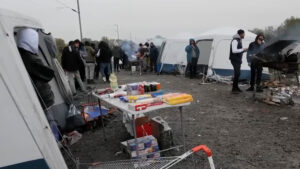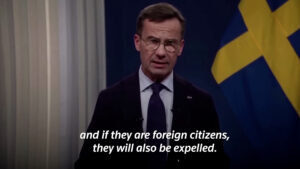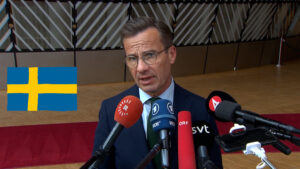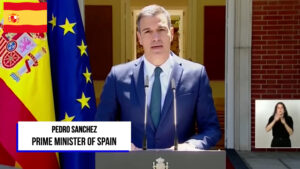By Rodaportal
INTRODUCTION
Europe has seen a significant change in its immigration and refugee policies over the last few years. The open-door policies, which were initially implemented and symbolized by German Chancellor Angela Merkel’s compassionate stance during the 2015 migration crisis, are now being replaced by a more prudent and conservative approach. The pressing issue at the forefront of this change is the acceptance of illegal migrants, causing serious challenges for countries across the continent.

In this exploration, we will delve into the seismic shift occurring across Europe as nations retreat from open-door migration policies towards more restricted and controlled approaches. The imperative to reassess these policies has intensified due to a stark reality. Europe is witnessing a troubling pattern where, instead of integration, immigrants exploit the generosity of accepting countries, often leading to societal issues such as terrorism, sexual assaults, and gang affiliations.
As a consequence, we are witnessing a growing tide of support for far-right politicians who promise stringent measures to address these challenges. This video seeks to unravel the complex reasons behind this shift and the critical need for Europe to find a delicate balance between compassion and self-preservation in its approach to migration policies. It is important to acknowledge that while seeking refuge, migrants do not have the right to reshape the cultural and religious fabric of the host nation. European countries, historically rooted in Christianity, demand respect for their cultural identity and social cohesion. Striking this balance becomes crucial as Europe navigates the intersection of compassion, cultural preservation, and pragmatic management of its borders.
Merkel’s Legacy and the Unintended Consequences:
In 2015, Angela Merkel’s decision to welcome a substantial number of refugees escaping conflict zones was seen as a moment of compassion. However, this decision also led to unforeseen consequences. Initially, many European countries joined in this show of solidarity. However, the sheer number of arrivals soon revealed the difficulties of assimilation, resource strains, and concerns about national security.
In 2021, Chancellor Olaf Scholz took over from Merkel, promising to continue her pro-migrant stance. However, within months, rapid policy changes occurred. Accommodating a high number of migrants became challenging, with a rise in Asylum Seeker applications and strains on resources.
Scholz’s administration implemented stricter measures, signalling a departure from Merkel’s approach. These changes included cutting benefits to Asylum Seekers, easing deportations, and taking a tougher stance against human traffickers.

Merkel’s open-door policy, while initially a display of compassion, faced significant challenges, leading to increased opposition, resource strains, and security concerns. The subsequent shift in Germany’s approach under Scholz reflects a response to these challenges and a reevaluation of the country’s stance on migration.
The UK’s Struggle with Illegal Migration:
The United Kingdom, despite being geographically separated from continental Europe, has faced several challenges with illegal migration. Issues such as human trafficking, clandestine border crossings, and the exploitation of vulnerable individuals have put a strain on the UK’s immigration system. As a result, there has been a shift in public sentiment towards finding a balance between humanitarian values and the practicality of managing illegal entry.

These challenges have had a direct impact on British citizens. The handling of asylum applications, including adults posing as children, has come under criticism, with various aspects of British society being affected. Illegal migrants, who are not allowed to have formal jobs, often work in the informal sector, leading to lower wages and putting a strain on public services.
The emergence of large migrant communities has introduced new challenges. Instances of riots and cultural clashes have raised concerns about social cohesion. British citizens are grappling with changes in their communities and cities, fearing a loss of cultural identity and a decline in overall societal harmony.

Sweden’s Social Integration Challenges:
Sweden has long been seen as a champion of liberal values, but the country has faced difficulties in integrating a large number of migrants into society. A rise in crime rates in certain areas, coupled with economic disparities and cultural differences, has led to concern among Swedes. This highlights the challenges of managing illegal migration while promoting inclusivity and diversity.
Recent events in Sweden have highlighted these ongoing challenges. The government, led by Prime Minister Ulf Kristersson, is seeking new rules for deporting immigrants, with a focus on issues such as substance abuse, association with criminal groups, and statements that threaten Swedish values. These proposed changes reflect a shift in the government’s approach to immigration, which is supported by the far-right Sweden Democrats.
The review of Swedish legislation aims to identify specific reasons for revoking residence permits due to lifestyle shortcomings, such as benefits fraud, debt, dishonest livelihood, substance abuse, and connections to criminal networks or extremist groups. The government is also considering statements that seriously threaten basic Swedish democratic values as grounds for deportation.

Sweden has also implemented changes in labour immigration laws. The new regulations state that work permits will only be granted to labour immigrants earning at least 80% of the Swedish median salary, aiming to tighten conditions for labour immigration and reduce fraud and exploitation.
These policy shifts reflect Sweden’s evolving approach to immigration, emphasizing the importance of adhering to basic norms for successful integration. The government’s commitment to reviewing and updating its immigration laws reflects a broader effort to address social, economic, and cultural challenges associated with large-scale migration since the 1990s.

France’s Security Concerns and Social Unrest:
France has been grappling with security concerns arising from illegal migration, particularly in the context of terror threats. Social unrest in the suburbs of major cities, often linked to issues of economic disparity and cultural friction, has prompted a reevaluation of France’s approach to immigration policies. The delicate balance between humanitarian values and national security is currently under scrutiny.
Recent developments indicate that France’s lawmakers are examining a draft immigration law that could limit the rights of asylum seekers and migrants. Human Rights Watch has raised concerns about some key provisions in the bill, including weakening protections for foreign nationals facing expulsion, withdrawing residence permits for non-compliance with “the principles of the Republic,” and limiting rights of appeal for asylum seekers. The proposed law also introduces measures related to the detention of migrant children, deportation of individuals with suspected links to “radical ideology,” and withdrawal of residence permits based on non-compliance with the “principles of the Republic.”

Human Rights Watch emphasizes that these proposed changes may undermine fundamental rights and protections, potentially conflicting with international conventions. The bill’s focus on security concerns raises questions about its impact on the rights and well-being of migrants, especially vulnerable groups such as children. The French government’s intention to add provisions making it easier to deport individuals with suspected links to “radical ideology” further emphasizes the security-oriented approach.
In addition to security-related measures, the bill addresses labour migration by introducing requirements for work permits linked to salary thresholds. This shift aims to tighten conditions for labour immigration and prevent exploitation.
These developments highlight the complex task facing France in managing immigration, where security concerns intersect with human rights considerations. The ongoing debate and potential enactment of the proposed immigration law will shape France’s policies and practices, influencing the delicate balance between security imperatives and the protection of individual rights.

Spain’s Border Management and Economic Impacts:
Spain, situated at the intersection of Europe and North Africa, has been struggling to deal with illegal migration through its borders. Balancing the economic strain of providing for a large number of migrants with the humanitarian challenge of addressing their needs has led to a re-evaluation of Spain’s migration policies. The country is faced with the difficult task of managing entry points while also grappling with the economic implications of migration.

Recent immigration data shows fluctuations in Spain’s migrant population. There was a peak between 1991 and 2009, followed by a drop after the 2008 financial crisis, and a resurgence after 2018 until the impact of Covid-19.
The foreign population in Spain increased from 637,085 in 1998 to 5,736,258 in 2012. In 2018, it was 4,734,681, and provisional data for 2021 indicates a figure of 5,440,148, which includes over one and a half million EU nationals. Non-EU immigrants mainly come from Africa and the Americas.

Netherlands and the Rise of Geert Wilders:
Geert Wilders’ recent win in the Netherlands reflects a growing trend of dissatisfaction with open-door migrant policies in Europe. Wilders, who is known for his anti-immigrant views, secured a significant victory for his Party for Freedom, making him a potential leader. His agenda, which is based on anti-Islam and anti-EU sentiments, gained popularity by addressing concerns about rising costs caused by energy inflation from the Ukraine war.
Wilders’ success is part of a broader European trend marked by the rise of far-right, authoritarian, anti-immigrant, Eurosceptic parties. This trend can be seen in Italy with Georgia Meloni as well. Despite his extreme anti-Islam views, signs of moderation are visible, possibly influenced by the need to form a coalition government.

The political shift to the right in Europe is impacting alliances, solidifying positions on migration and asylum, and raising concerns about the influence on EU policies. This trend reflects economic anxieties, migration challenges, and a perceived failure of the left to convincingly address critical issues.
Greece and Cyprus: Border Frontiers under Pressure:
Greece and Cyprus, located in the southeastern part of Europe, have become the front line of the migration challenge due to their past policies. However, their continuous acceptance of migrants, driven by ineffective political strategies, poses an urgent threat to the economic stability of both nations. Rather than contributing to economic growth, these policies have resulted in a drain on the countries’ financial resources as they provide benefits and support to illegal migrants.
The economic burden is increasing rapidly with the ongoing provision of benefits and resources to an unsustainable influx of migrants. Urgent resolution is needed to address this pressing issue, as the current trajectory not only jeopardizes the economic well-being of Greece and Cyprus but also undermines national security and stability. Swift and effective policy adjustments are imperative to alleviate the strain on resources and redirect efforts towards sustainable economic development, ensuring the long-term prosperity of these nations.

Conclusion:
Europe’s inability to create an effective migration and asylum policy is a significant challenge that not only hinders the process of European integration but also fuels the growth of far-right ideologies. The lack of a unified approach exposes the continent’s vulnerability, with migration becoming a divisive issue across various societal and political levels.
To address these issues, it is crucial to recognize the urgent need for a reassessment of Europe’s migration policies. The focus should be redirected toward prioritizing the well-being and interests of European nations, their history, and culture. It is imperative to recalibrate policies, emphasizing the importance of putting the needs of nationals first, securing the continent’s borders, and redirecting migrants to safe countries with similar cultural and religious backgrounds. Such measures are necessary not only for the economic prosperity of European nations but also to ensure the preservation of their cultural identity and societal stability.
Please support our video by subscribing and liking it, and always remember to Stay Informed and Stay Engaged.

